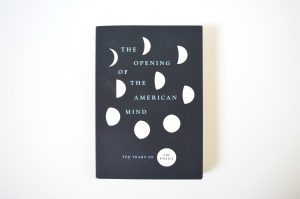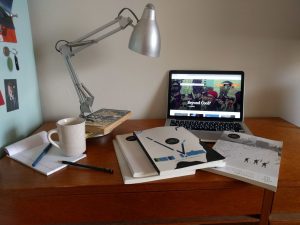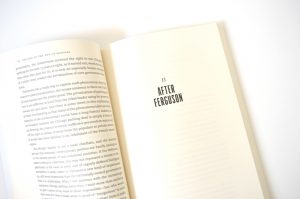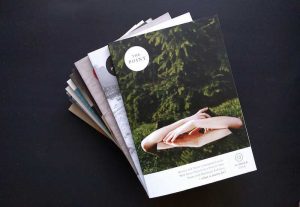The Making of a Magazine: A Dialogue with the Team Behind “The Point”
Highlighting the first decade of Chicago-based philosophical magazine The Point, The Opening of the American Mind brings together responses to some of the most significant events and issues of the last ten years. We spoke with some of The Point’s team to hear more about the new book, their current work, and how this whole project got started.
To learn more about The Point, check out their website: https://thepointmag.com/
First of all, could you each say what your roles are at The Point?
Jonny Thakkar: I am one of the editors. This involves a mixture of tasks. Sometimes I’m the lead editor on a piece, in charge of communication with an author, and other times I’m supporting the lead editor of a piece by giving line edits or a second opinion. I have to be on the lookout for potential writers and also for themes and topics that we might want to cover in some way. Finally, I’m also involved in strategic decisions regarding the development of the magazine and its place in the cultural landscape.

Anastasia Berg: Like Jonny, I’m also an editor. I solicit and edit pieces for the print magazine and our website and am involved in the long-term planning for the magazine. And for the past couple of years I’ve had the great pleasure of serving as the lead editor for Agnes Callard’s public philosophy column!
Rachel Wiseman: I’m the managing editor of the magazine, which is a very catchall kind of position. On the most elementary level, I make sure the magazine continues to run smoothly. With the other editors, I plan and manage submissions for our print issues and website and execute on operational and strategic projects to keep the magazine publishing. I also commission and edit essays for the print magazine and the website.
Jonny, can you talk a bit about The Point’s founding. What was the idea that sparked this?
Jonny: Jon [Baskin], Etay [Zwick], and I were all grad students at the University of Chicago’s Committee on Social Thought, but we also all had some interest and experience in journalism. One night in the university pub, sometime in the fall of 2008 if I remember rightly, we got talking about the relationship between the ideas we were coming across in Social Thought, where the curriculum revolved around great books from the past, and the lives we were actually leading. We didn’t see that depth of thought in anything we were reading in supposedly sophisticated magazines, but at the same time we also found ourselves dissatisfied with the way academics seemed to see conversation among themselves as an end in itself. Surely the point of all this learning was to illuminate the culture and society we were living in? That was how it began with Socrates and Plato, it seemed to us, and that is what we wanted to help restore: the examined life. That meant longform articles that would be elegantly written, with engaging narratives and avoiding all jargon, while also challenging readers to question their own beliefs and assumptions. Politically speaking, this meant avoiding the temptation to publish only articles whose conclusions we agreed with. That, we thought, would over time lead to a form of intellectual torpor that would be the opposite of the examined life.
What stood out for me about “The Point” was that it dared to reflect seriously on aspects of our life—like food, video games, online dating, Oprah—which, if they were written about at all elsewhere, would be treated as guilty pleasures at best and meaningless distractions at worst.

Anastasia and Rachel, what drew you to working with The Point? Was there something in particular that got you excited about the magazine?
Rachel: I learned about The Point when I was working for an undergraduate weekly newspaper. They did a small feature on this new literary magazine started by a few grad students in Social Thought. At the time it didn’t seem like there was much of a literary scene in Chicago beyond poetry, and here was this ambitious new magazine that was literary and intellectual. What stood out for me about The Point was that it dared to reflect seriously on aspects of our life—like food, video games, online dating, Oprah—which, if they were written about at all elsewhere, would be treated as guilty pleasures at best and meaningless distractions at worst. The Point was willing to take these things very seriously because it embraced what seemed to me to be a very UChicago way of thinking, a real concern for what makes life worth living. Not to mention the fact that (by UChicago undergrad standards anyway) their release parties were the social events of the season.
Anastasia: The coolest people in my grad program were putting out the most interesting literary magazine in the country—of course I was looking for an opportunity to join from the moment I learned about it. I finally got my shot the summer before the 2016 election. As I saw it at the time, editing for The Point was a natural extension of the work I was doing in graduate school—taking intellectual history very seriously as a means to making sense of the present—and I’d get paid! I wasn’t doing it for the “public good”—and, at the time, why would I? I mean, the world wasn’t doing well, but things looked like they were on a clear, forward trajectory: Obama would soon hand over the presidency to Clinton; the U.K. was in the E.U. . . . To put things into context, the first issue I worked on featured a symposium on the pressing question “What is poetry for?”
Nevertheless, during the run-up to the election, we found ourselves wanting to understand where the energy behind Trump was coming from. In the summer of 2016, we invited writers to reflect on the question “What is America for?” And then after the election, what we were doing, trying to attend to the deeper philosophical issues at stake in the background of contemporary debates, suddenly felt urgent and vital. Everywhere one could hear growing calls to resist the creation of political, cultural and geographical echo chambers, and it seemed like we were uniquely positioned to do just that. That’s when I really began to recognize our magazine’s mission: to chart a way of persevering in the face of apparent catastrophe, while avoiding apathy and cynicism on the one hand and magical thinking on the other. After that, I was all in.
What are some types of writing that catch your attention as an editor?

Jonny: The pieces that catch my attention are those that feel fresh and unpredictable relative to our established sense of the political or philosophical landscape. We look for the kind of essays where a writer combines autobiographical and intellectual reflections, so that the reader gets a sense of the relation between the question of what to think and the question of how to live. And, of course, pieces from people who you don’t normally hear from in mainstream magazines and/or literary magazines—one example would be the essay on celibacy by the Cistercian monk Pater Edmund Waldstein in our latest issue’s sex symposium, or the philosopher Robert Pippin on Hegel’s critique of capitalism, from the previous issue.
Anastasia: A question we ask often when reading a piece is, Would this really provoke our readers to look at something differently, consider something they haven’t before, shed new light on a matter of concern for them, or would it just confirm whatever opinions and prejudices they already have with, say, the aid of some theoretical apparatus? We pride ourselves on publishing many new writers—including many some of whom have never been published in a nonacademic journal before, or maybe been published at all. That often means investing more effort on the front end helping them develop their ideas. We always try to make sure that the essay is up to the task of keeping the audience’s interest. For our writers who come out of the academy, this means making sure that the piece does not just translate technical terms into more familiar ones or doing more explaining to try to popularize or dumb down complicated arguments. Our audience doesn’t come to us for very rudimentary philosophy lectures but for sophisticated, unpredictable lines of thought that make contact with their lives and interests.
I really began to recognize our magazine’s mission: to chart a way of persevering in the face of apparent catastrophe, while avoiding apathy and cynicism on the one hand and magical thinking on the other.
Can you talk a bit about the process of putting together this anthology—what criteria were you working with when deciding which essays to feature?
Rachel: We’ve wanted to publish an essay collection for a long time. As our tenth anniversary approached, we knew we wanted to celebrate the occasion with an anthology that collected Point essays from the past ten years, but we also knew we wanted it to be more than a typical “best of” collection. We wanted the collection to have an internal unity to it, and to make an argument that would speak directly to the concerns of the present. We bounced around a few different ideas, but soon enough we thought back to what was happening in 2009, when the magazine was founded—Obama’s inauguration and the seeming triumph of hope and change in the midst of the worst financial crisis since the Great Depression. We realized that the first decade of The Point was also a tumultuous decade of social and political movements and intellectual transformation, from Obama to Trump, from the financial crisis to Occupy to Black Lives Matter, an era that witnessed the resurgence of both democratic socialism and the nationalist right. When plotting out the collection, tracing the changes in the intellectual and political landscape of the past decade, we knew that it wouldn’t be complete without some of our favorite essays that we’ve published, though that wasn’t the only criterion. We sought out the pieces in our archive that offered a window into the moment, how we and our writers were thinking about the storm of history we found ourselves in at that time. We then tried to arrange them according to certain roughly chronological categories or themes—which, in sequence, helped to bring out the insights of each essay, building to an argument we couldn’t have understood we were making back when the magazine was founded. And from that point, it was just a matter of trying to keep things within a reasonable page count!
The decade covered by the new anthology was full of significant events and cultural turns, and the coming decade is already shaping up to be a fascinating and peculiar time as well. How do you envision the life of The Point evolving over the next ten years?

Jonny: It’s hard to say how The Point will evolve over the next ten years because it’s hard to say how the broader cultural landscape will evolve. Looking at the way the magazine developed over the previous ten years, it’s clear that we were responding both to the reconfiguration of American political horizons after 2008 and to changes in intellectual-literary life—a growing political discipline and a related closed-mindedness—that was probably fostered by the rise of social media. Who knows whether these trends will continue, or which new trends will emerge? All I can say is that whatever happens, The Point will continue to promote, and to fight for, the ideal of examined life.
Rachel: One thing I can say for certain is that we plan to keep building on the foundation we’ve built over our first ten years in print—publishing more original thinking and writing, continuing to expand into genres like fiction and long-form reportage, and deepening The Point’s commitment to education, as an independent institution dedicated to the public humanities. And, coming out of the election, it’s clear that intellectual magazines like ours will need to continue to adapt. Back when Trump was first elected, we published a symposium on the role of the intellectual in public life and as a force of opposition. Now, after four years in the trenches of the “resistance,” there’s a question right now about where intellectual magazines ought to go from here. What should they try to accomplish, now that they’ve regained some measure of power and influence (though still not as much as they hoped)? These are things that we’re thinking and talking a lot about—but we don’t have a clear picture yet what it all means for The Point. We’ll just have to keep doing our best to respond to the demands of the moment, trying to think things through as we go.
Anastasia: I completely agree with Jonny and Rachel, I’ll just add that it would be great if we could also find ways of preserving an attitude and sensibility that I see as genuinely endangered, namely, the one of having a sense of humor. There’s a lot of dead earnestness, on the one hand, and mockery and snark, on the other, but having a sense of humor means first being able to make fun of yourself! I’m not sure how you do that in a literary magazine, but I’m determined to try.
The Opening of the American Mind: Ten Years of The Point is available now from our website or your favorite bookseller.